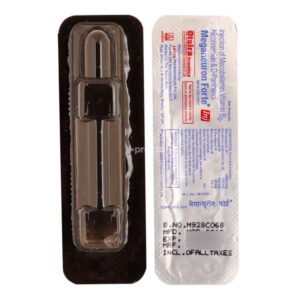B6 + INJ OF VIT.B1
B6: B6, also known as pyridoxine, is a water-soluble vitamin that plays a crucial role in various biological processes in the body. It is used therapeutically to treat or prevent vitamin B6 deficiency, as well as for other medical conditions.
The main mechanism of action of B6 is its involvement in the metabolism of amino acids, carbohydrates, and lipids. It acts as a coenzyme in these metabolic pathways, facilitating the conversion of various compounds and assisting in the synthesis of neurotransmitters such as serotonin, dopamine, and norepinephrine.
B6 is often used to prevent or treat vitamin B6 deficiency caused by poor diet, malabsorption syndromes, certain medications, or medical conditions that impair its absorption or utilization. It may also be prescribed for pregnant women to reduce the risk of certain birth defects, such as neural tube defects. Additionally, B6 is sometimes used off-label to alleviate symptoms of premenstrual syndrome (PMS), nausea during pregnancy, and certain rare genetic disorders.
The recommended dose of B6 varies depending on age, gender, and specific medical conditions. For adults, the recommended dietary allowance (RDA) is 1.3-1.7 mg per day. Higher doses may be prescribed for therapeutic purposes or under medical supervision.
While B6 is generally considered safe in recommended doses, high doses (exceeding 200 mg per day) or long-term use can lead to toxicity. Symptoms of B6 toxicity may include peripheral neuropathy (nerve damage), numbness, tingling, or pain in the extremities, loss of coordination, difficulty walking, and photosensitivity (sensitivity to light). It is important to follow the recommended dosage guidelines and consult a healthcare professional before taking high doses of B6.
In summary, B6 is a vitamin used to prevent or treat B6 deficiency and is involved in various metabolic processes in the body. It should be taken in recommended doses to avoid potential side effects associated with excessive intake.
Inj Of Vit.b1: The drug Inj Of Vit.b1 is an injectable form of Vitamin B1, also known as thiamine. It is primarily used to treat thiamine deficiency conditions such as beriberi, Wernicke-Korsakoff syndrome, and other ailments resulting from Vitamin B1 deficiency.
The mechanism of action of Inj Of Vit.b1 involves its conversion into an active form called thiamine pyrophosphate (TPP). TPP plays a crucial role as a coenzyme in several enzymatic reactions involved in carbohydrate metabolism, amino acid synthesis, and the Krebs cycle. By replenishing thiamine levels in the body, Inj Of Vit.b1 helps restore optimal cellular functioning and energy production.
Inj Of Vit.b1 is administered via intramuscular or intravenous injection. The recommended dose depends on the severity of the deficiency and the specific condition being treated. Typically, an initial dose of 100 mg is given, followed by daily maintenance doses of 10-25 mg until the symptoms improve.
Side effects of Inj Of Vit.b1 are minimal and rare, as thiamine is generally considered safe. However, some individuals may experience allergic reactions such as itching, rash, or swelling. In very rare cases, high doses of thiamine may cause anaphylactic shock. If any unusual or severe side effects occur, it is important to seek immediate medical attention.
Overall, Inj Of Vit.b1 is a vital medication for treating thiamine deficiency-related conditions. However, it is essential to use this drug under medical supervision and follow the prescribed dosage and instructions to ensure safe and effective treatment.

